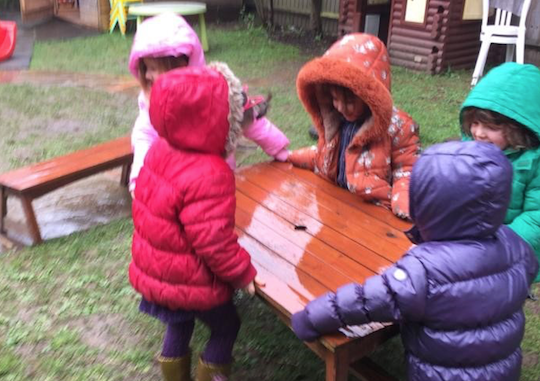Teaching values to the very young: Can it be done?

‘Educate the child when they are young and when they grow old they shall not depart from it.’
—King Solomon
‘Know that the beginning is most important part of any work, especially in the case of the young and tender, for this is when the character is being formed and when everything that is seen and heard makes an impression.’
—Plato
‘With proper care and help a child can grow to greater strength and attain better mental balance. Just as physical hygiene wards off injuries to his body, so we need mental hygiene to protect his mind and soul from harm.’
—Dr. Maria Montessori
As religion has largely faded away from many schools that are now ‘non-denominational,’ what what value system is there for our children to learn, or will they just pick up principles along the way?
Some attributes are inherited and some are learned through habit. Good education is about not taking anything for granted and making sure that everything that really matters in life is taught to the child.
How can it be done?
In his book Quiet Revolution, Neil Hawkes, a headmaster, creates a values-based programme to encourage adults to model values and to help children develop holistically. The programme nurtures a secure sense of respect for self and others.
Creating a values programme involves choosing the values you feel are relevant and pertinent for your setting and working with the whole nursery community of children, parents and staff. At the beginning of each half term the value is introduced, discussed and practised in a creative variety of ways over the following six weeks. Parents are then encouraged to support the Values programme in whichever ways they can.
A list of possible values for the very young could be: kindness, responsibility, happiness, gratitude, perseverance, respect, honesty, friendship, generosity and peace.
Songs and stories go a long way to really enhance and bring to life the value, such as The Rainbow Fish to illustrate friendship, Pinocchio for honesty.
Spotting the children doing it right and immediately acknowledging their achievement breeds success. Writing and displaying these acts in a prominent position—and reading them out while the child is by your side and the parents are watching—cements these values. These are extremely valuable lessons we can impart to our children for life.
What can you expect?
Some real examples:
Responsibility
- Z. put away two mats that other children had left behind
- S. collected all the paintbrushes after outdoor play
- J. listened to his mummy and put his seatbelt on in the car
Gratitude
- M. is happy to have two big brothers who share their toys
- D. appreciated his dad took him for a picnic
Generosity
- L & D. like to share their left over fruit with their friends at snack time
- A. brought a piece of paper for L. so she could paint
Friendship
- G. found A’s lost cat and gave it to her
- L gave C the green cup when he came to her house because he loves green
Kindness
- A. helps her mummy with the baby and fetches his nappies
- E. tried to pick up Y. when he fell down in the garden
- L. slept in her own bed and didn’t wake up her mummy
Young children can be very responsive to your expectations. Once they know that this behaviour is desired they often rise to the occasion in their own way. Establishing a baseline value system in today’s children is laying the foundation for the future.
After all, the children in the classroom today are the caretakers of society tomorrow.
- Ofsted Gives The Nursery Its Top Outstanding Grade
- The Nursery Is A Crown Jewel In Our Midst
- I Felt The Warmth At Graduation
- What This Parent Learned At A Hands-On Montessori Evening
- Teaching Values To The Very Young: Can It Be Done?
- Why Tomorrow Matters Now
